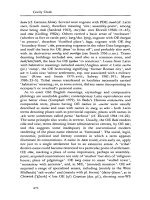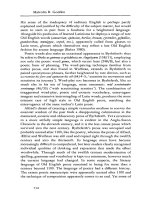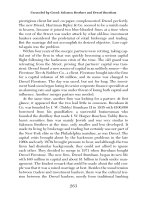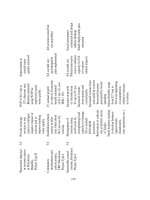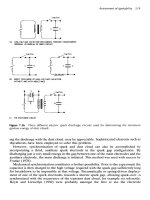the bastiat collection volume 1 phần 9 ppt
Bạn đang xem bản rút gọn của tài liệu. Xem và tải ngay bản đầy đủ của tài liệu tại đây (191.4 KB, 46 trang )
6
TO ARTISANS AND WORKMEN
M
any journals have attacked me in your presence and
hearing.
1
Perhaps you will not object to read my
defense.
I am not suspicious. When a man writes or speaks, I take it for
granted that he believes what he says.
And yet, after reading and re-reading the journals to which I
now reply, I seem unable to discover any other than melancholy
tendencies.
Our present business is to inquire which is more favorable to
your interests—liberty or restriction.
I believe that it is liberty; they believe that it is restriction. It
is for each party to prove his own thesis.
Was it necessary to insinuate that we free traders are the
agents of England, of the south of France, of the Government?
On this point you see how easy recrimination would be.
351
1
This article appeared in the Courier Francaise of September, 1846, in
reply to articles that had appeared in L’Atelier.
Social Fallacies 2 Chap Six.qxd 7/6/2007 10:59 AM Page 351
We are the agents of England, they say, because some of us
employ the words “meeting” and “free trader”!
And do they not make use of the words “drawback” and
“budget”?
We, it would seem, imitate Cobden and the English democ-
racy!
And do they not parody Lord George Bentinck and the British
aristocracy?
We borrow from perfidious Albion the doctrine of liberty!
And do they not borrow from the same source the quibbles of
protection?
We follow the lead of Bordeaux and the south!
And do they not avail themselves of the cupidity of Lille and
the north?
We favor the secret designs of the ministry, whose object is to
divert public attention from their real policy!
And do they not act in the interest of the civil list, which prof-
its most of all from the policy of protection?
You see, then, very clearly, that if we did not despise this war
of disparagement, arms would not be wanting to carry it on.
But this is beside the question.
The question, and we must never lose sight of it, is this:
Whether it is better for the working classes to be free, or not
to be free to purchase foreign commodities?
Workmen! They tell you that: “If you are free to purchase
from the foreigner those things that you now produce yourselves,
you will cease to produce them; you will be without employment,
without wages, and without bread. It is therefore for your own
good to restrain your liberty.”
This objection recurs in every form: They say, for example,
“If we clothe ourselves with English cloth; if we make our
ploughs of English iron; if we cut our bread with English knives;
if we wipe our hands with English towels—what will become of
French workmen, what will become of national labor?”
Tell me, workmen! If a man should stand on the quay at Bou-
logne and say to every Englishman who landed, “If you will give
352 The Bastiat Collection
Social Fallacies 2 Chap Six.qxd 7/6/2007 10:59 AM Page 352
me those English boots, I will give you this French hat”; or, “If
you will give me that English horse I will give you this French
tilbury”; or ask him, “Will you exchange that machine made at
Birmingham for this clock made at Paris?”; or, again, “Can you
arrange to barter this Newcastle coal against this champagne
wine?” Tell me whether, assuming this man to make his propos-
als with discernment, anyone would be justified in saying that our
national labor, taken in the aggregate, would suffer in conse-
quence?
Would it make the slightest difference in this respect were
twenty such offers to be made in place of one, or a million such
barters to be effected in place of four, or were merchants and
money to intervene, whereby such transactions would be greatly
facilitated and multiplied?
Now, when one country buys from another wholesale to sell
again in retail, or buys in retail to sell again in bulk, if we trace
the transaction to its ultimate results we shall always find that
commerce resolves itself into barter, products for products, serv-
ices for services. If, then, barter does no injury to national labor,
since it implies as much national labor given as foreign labor
received, it follows that a hundred thousand millions of such acts
of barter would do as little injury as one. But where would be the
profit? you will ask. The profit consists in turning to most
account the resources of each country, so that the same amount
of labor shall yield everywhere more satisfaction and well-being.
There are some who in your case have recourse to a singular
system of tactics. They begin by admitting the superiority of the
free to the prohibitive system, in order, doubtless, not to have the
battle to fight on this ground.
Then they remark that the transition from one system to
another is always attended with some displacement of labor.
Last, they enlarge on the sufferings, which, in their opinion,
such displacements must always entail. They exaggerate these suf-
ferings, they multiply them, they make them the principal subject
of discussion, they present them as the exclusive and definite
Economic Sophisms—Second Series 353
Social Fallacies 2 Chap Six.qxd 7/6/2007 10:59 AM Page 353
354 The Bastiat Collection
result of reform, and in this way they endeavor to enlist you
under the banners of monopoly.
This is just the system of tactics that has been employed to
defend every system of abuse; and one thing I must plainly avow
that it is this system of tactics that constantly embarrasses those
who advocate reforms, even those most useful to the people. You
will soon see the reason of this.
When an abuse has once taken root everything is arranged on
the assumption of its continuance. Some men depend upon it for
subsistence, others depend upon them, and so on, till a formida-
ble edifice is erected.
Would you venture to pull it down? All cry out, and—remark
this well—the men who bawl out appear always at first sight to be
in the right, because it is far easier to show the derangements that
must accompany a reform than the arrangements that must fol-
low it.
The supporters of abuses cite particular instances of suffer-
ings; they point out particular employers who, with their work-
men and the people who supply them with materials, are about to
be injured; and the poor reformer can only refer to the general
good that must gradually diffuse itself over the masses. That by
no means produces the same effect.
Thus, when the question turns on the abolition of slavery,
“Poor men!” they say to the negroes, “who is henceforth to sup-
port you? The manager handles the lash, but he likewise distrib-
utes the cassava.”
And the slave regrets his chain, for he asks, “Whence will
come the cassava?”
He fails to see that it is not the manager who feeds him, but
his own labor that feeds both him and the manager.
When they set about reforming the convents in Spain, they
asked the beggars: “Where will you now find food and clothing?
The prior is your best friend. Is it not very convenient to be in a
situation to address yourself to him?”
Social Fallacies 2 Chap Six.qxd 7/6/2007 10:59 AM Page 354
And the mendicants replied: “True; if the prior goes away we
see very clearly that we shall be losers, and we do not see at all so
clearly who is to come in his place.”
They did not take into account that, if the convents bestowed
alms, they lived upon them; so that the nation had more to give
away than to receive.
In the same way, workmen! monopoly, quite imperceptibly,
saddles you with taxes, and then, with the produce of these taxes,
finds you employment.
And your sham friends exclaim: “But for monopolies where
would you find employment?”
And you, like the Spanish beggars, reply: “True, true; the
employment the monopolists find us is certain. The promises of
liberty are of uncertain fulfillment.”
For you do not see that they take from you in the first
instance the money with part of which they afterwards afford you
employment.
You ask: Who is to find you employment? and the answer is
that you will give employment to one another! With the money
of which he is no longer deprived by taxation the shoemaker will
dress better, and give employment to the tailor. The tailor will
more frequently renew his foot-gear, and afford employment to
the shoemaker; and the same thing will take place in all other
departments of trade.
It has been said that under a system of free trade we should
have fewer workmen in our mines and spinning mills.
I do not think so. But if this happened, we should necessarily
have a greater number of people working freely and independ-
ently, either in their own houses or at outdoor employment. For
if our mines and spinning mills are not capable of supporting
themselves, as is asserted, without the aid of taxes levied from the
public at large, the moment these taxes are repealed everybody
will be by so much in better circumstances; and it is this improve-
ment in the general circumstances of the community that lends
support to individual branches of industry.
Economic Sophisms—Second Series 355
Social Fallacies 2 Chap Six.qxd 7/6/2007 10:59 AM Page 355
Pardon my dwelling a little longer on this view of the subject;
for my great anxiety is to see you all ranged on the side of liberty.
Suppose that the capital employed in manufactures yields 5
percent profit. But Mondor has an establishment in which he
employs £100,000, at a loss, instead of a profit, of 5 percent.
Between the loss and the gain supposed, there is a difference of
£10,000. What takes place? A small tax of £10,000 is coolly
levied from the public, and handed over to Mondor. You don’t
see it, for the thing is skillfully disguised. It is not the taxgatherer
who waits upon you to demand your share of this burden; but
you pay it to Mondor, the ironmaster, every time that you pur-
chase your trowels, hatchets, and planes. Then they tell you that
unless you pay this tax, Mondor will not be able to give employ-
ment; and his workmen, James and John, must go without work.
And yet, if they gave up the tax, it would enable you to find
employment for one another, independently of Mondor.
And then, you may be sure, after this smooth pillow of pro-
tection has been taken away, Mondor will set his wits to work to
convert his loss into a profit, and James and John will not be sent
away, in which case there will be profit for everybody.
You may still rejoin, “We allow that, after the reform, there
will be more employment upon the whole than before; in the
meantime, James and John are starving.”
To which I reply:
First—That when labor is only displaced, to be augmented, a
man who has a head and hands is seldom left long in a state of
destitution.
Second—There is nothing to hinder the State’s reserving a fund
to meet, during the transition, any temporary want of employment,
in which, however, for my own part, I do not believe.
Third—If I do not misunderstand the workmen, they are
quite prepared to encounter any temporary suffering necessarily
attendant on a transfer of labor from one department to another,
by which the community are more likely to be benefited and have
justice done them. I only wish I could say the same thing of their
employers!
356 The Bastiat Collection
Social Fallacies 2 Chap Six.qxd 7/6/2007 10:59 AM Page 356
What! Will it be said that because you are workmen you are
for that reason unintelligent and immoral? Your pretended friends
seem to think so. Is it not surprising that in your hearing they
should discuss such a question, talking exclusively of wages and
profits without ever once allowing the word justice to pass their
lips? And yet they know that restriction is unjust. Why have they
not the courage to admit it, and say to you, “Workmen! An iniq-
uity prevails in this country, but it is profitable to you, and we
must maintain it.” Why? Because they know you would answer,
No.
But it is not true that this injustice is profitable to you. Give
me your attention for a few moments longer, and then judge for
yourselves.
What is it that we protect in France? Things that are produced
on a great scale by rich capitalists and in large establishments, as
iron, coal, cloth, and textile fabrics; and they tell you that this is
done not in the interest of employers, but in yours, and in order
to secure you employment.
And yet whenever foreign labor presents itself in our markets,
in such a shape that it may be injurious to you but advantageous
for your employers, it is allowed to enter without any restriction
being imposed.
Are there not in Paris 30,000 Germans who make clothes and
shoes? Why are they permitted to establish themselves alongside
you while the importation of cloth is restricted? Because cloth is
manufactured in grand establishments that belong to manufactur-
ing legislators. But clothes are made by workmen in their own
houses. In converting wool into cloth, these gentlemen desire to
have no competition, because that is their trade; but in convert-
ing cloth into coats, they allow it, because that is your trade.
In making our railways, an embargo was laid on English rails,
but English workmen were brought over. Why was this? Simply
because English rails came into competition with the iron pro-
duced in our great establishments, while the English laborers were
only your rivals.
Economic Sophisms—Second Series 357
Social Fallacies 2 Chap Six.qxd 7/6/2007 10:59 AM Page 357
We have no wish that German tailors and English navies
should be kept out of France. What we ask is, that the entry of
cloth and rails should be left free. We simply demand justice and
equality before the law, for all.
It is a mockery to tell us that customs restrictions are imposed
for your benefit. Tailors, shoemakers, carpenters, masons, black-
smiths, shopkeepers, grocers, watchmakers, butchers, bakers,
dressmakers! I defy you all to point out a single way in which
restriction is profitable to you, and I shall point out, whenever
you desire it, four ways in which it is hurtful to you.
And, after all, see how little foundation your journalists have
for attributing self-abnegation to the monopolists.
I may venture to denominate the rate of wages that settles and
establishes itself naturally under a system of freedom, the natural
rate of wages. When you affirm, therefore, that restriction is prof-
itable to you, it is tantamount to affirming that it adds a premium
to your natural wages. Now, a surplus of wages beyond the natu-
ral rate must come from some quarter or other; it does not fall
from the skies, but comes from those who pay it.
You are landed, then, in this conclusion by your pretended
friends, that the policy of protection has been introduced in order
that the interests of capitalists should be sacrificed to those of the
workmen.
Do you think this probable?
Where is your place, then, in the Chamber of Peers? When
did you take your seat in the Palais Bourbon? Who has consulted
you? Whence did this idea of establishing a policy of protection
come to you?
I think I hear you answer, “It is not we who have established
it. Alas! We are neither Peers, nor Deputies, nor Councillors of
State. The capitalists have done it all.”
Verily, they must have been in a good humour that day! What!
these capitalists have made the law; they have established a policy
of prohibition for the express purpose of enabling you to profit
at their expense!
358 The Bastiat Collection
Social Fallacies 2 Chap Six.qxd 7/6/2007 10:59 AM Page 358
But here is something stranger still.
How does it come to pass that your pretended friends, who
hold forth to you on the goodness, the generosity, and the self-
abnegation of capitalists, never cease sympathizing with you on
your being deprived of your political rights? From their point of
view, I would ask what you could make of such rights if you had
them? The capitalists have a monopoly of legislation—granted.
By means of this monopoly, they have adjudged themselves a
monopoly of iron, of cloth, of textile fabrics, of coal, of wood, of
meat—granted likewise. But here are your pretended friends,
who tell you that in acting thus, capitalists have impoverished
themselves, without being under any obligation to do so, in order
to enrich you who have no right to be enriched! Assuredly, if you
were electors and deputies tomorrow, you could not manage your
affairs better than they are managed for you; you could not even
manage them so well.
If the industrial legislation under which you live is intended
for your profit, it is an act of perfidy to demand for your politi-
cal rights; for these new-fashioned democrats never can escape
this dilemma—the law made by the middle classes either gives
you more, or it gives you less, than your natural wages. If that law
gives you less, they deceive you, in soliciting you to maintain it. If
it gives you more, they still deceive you, by inviting you to
demand political rights at the very time when they are making
sacrifices for you, which, in common honesty, you could not by
your votes exact, even if you had the power.
Workmen! I should be sorry indeed if this address should
excite in your minds feelings of irritation against the rich. If self-
interest, badly understood, or too apt to be alarmed, still main-
tains monopoly, let us not forget that monopoly has its root in
errors that are common to both capitalists and workmen; instead
of exciting the one class against the other, let us try to bring them
together. And for that end what ought we to do? If it be true that
the natural social tendencies concur in levelling inequalities
among men, we have only to allow these tendencies to act, remove
Economic Sophisms—Second Series 359
Social Fallacies 2 Chap Six.qxd 7/6/2007 10:59 AM Page 359
artificial obstructions that retard their operation, and allow the
relations of the various classes of society to be established on the
principle of JUSTICE, which, in my mind at least, is identical with
the principle of LIBERTY.
360 The Bastiat Collection
Social Fallacies 2 Chap Six.qxd 7/6/2007 10:59 AM Page 360
7
A CHINESE STORY
T
here is nothing that is not pretended by the writers in favor
of Protection to be established as an aid to the working
classes—there is positively no exception, not even the cus-
tom house. You fancy, perhaps, that the custom house is merely
an instrument of taxation like property taxes or the toll-bar!
Nothing of the kind. It is essentially an institution for promoting
the march of civilization, fraternity, and equality. What would you
be at? It is the fashion to introduce, or affect to introduce, senti-
ment and sentimentalism everywhere, even into the toll-gath-
erer’s booth.
The custom house, we must allow, has a very singular machin-
ery for realizing philanthropical aspirations.
It includes an army of directors, subdirectors, inspectors,
subinspectors, comptrollers, examiners, heads of departments,
clerks, supernumeraries, aspirant-supernumeraries, not to speak
of the officers of the active service; and the object of all this com-
plicated machinery is to exercise over the industry of the people
a negative action, which is summed up in the word “obstruct.”
361
Social Fallacies 2 Chap Seven.qxd 7/6/2007 10:59 AM Page 361
Observe, I do not say that the object is to tax, but to obstruct.
To prevent, not acts that are repugnant to good morals or public
order, but transactions that are in themselves not only harmless
but fitted to maintain peace and union among nations.
And yet the human race is so flexible and elastic that it always
surmounts these obstructions. And then we hear of the labor mar-
ket being glutted.
If you hinder a people from obtaining its subsistence from
abroad it will produce it at home. The labor is greater and more
painful, but subsistence must be had. If you hinder a man from
traversing the valley he must cross the hills. The road is longer
and more difficult, but he must get to his journey’s end.
This is lamentable, but we come now to what is ludicrous.
When the law has thus created obstacles, and when in order to
overcome them society has diverted a corresponding amount of
labor from other employments, you are no longer permitted to
demand a reform. If you point to the obstacle you are told of the
amount of labor to which it has given employment. And if you
rejoin that this labor is not created, but displaced, you are
answered in the words of the Esprit Public, “The impoverishment
alone is certain and immediate; as to our enrichment, it is more
than problematical.”
This reminds me of a Chinese story, which I will relate to you.
There were in China two large towns, called Tchin and Tchan.
A magnificent canal united them. The Emperor thought fit to
order enormous blocks of stone to be thrown into it for the pur-
pose of rendering it useless.
On seeing this, Kouang, his first mandarin, said to him,
“Son of Heaven! This is a mistake.”
To which the Emperor replied,
“Kouang, you talk nonsense.”
I give you only the substance of their conversation.
At the end of three months the Celestial Emperor sent again
for the mandarin, and said to him,
“Kouang, behold!”
And Kouang opened his eyes, and looked.
362 The Bastiat Collection
Social Fallacies 2 Chap Seven.qxd 7/6/2007 10:59 AM Page 362
And he saw at some distance from the canal a multitude of
men at work. Some were excavating, others were filling up hol-
lows, levelling and paving. And the mandarin, who was very cul-
tivated, said to himself: They are making a highway.
When other three months had elapsed the Emperor again sent
for Kouang, and said to him,
“Look!”
And Kouang looked.
And he saw the road completed, and from one end of it to the
other he saw here and there inns for travellers erected. Crowds of
pedestrians, carts, litters, came and went, and innumerable Chi-
nese, overcome with fatigue, carried back and forth heavy bur-
dens from Tchin to Tchan, and from Tchan to Tchin. And Kouang
said to himself: It is the destruction of the canal that gives
employment to these poor people. But the idea never struck him
that their labor was simply diverted from other employments.
Three months more passed, and the Emperor said to Kouang,
“Look!”
And Kouang looked. And he saw that the hostelries were full
of travellers, and that to supply their wants there were grouped
around them butchers’ and bakers’ stalls, shops for the sale of edi-
ble birds’ nests. He also saw that, the artisans having need of
clothing, there had settled among them tailors, shoemakers, and
those who sold parasols and fans; and as they could not sleep in
the open air, even in the Celestial Empire, there were also
masons, carpenters, and slaters. Then there were officers of
police, judges, fakirs; in a word, a town with its suburbs had risen
round each hostelry.
And the Emperor asked Kouang what he thought of all this.
And Kouang said that he never could have imagined that the
destruction of a canal could have provided employment for so
many people; for the thought never struck him that this was not
employment created but labor diverted from other employments,
and that men would have eaten and drunk in passing along the
canal as well as in passing along the highroad.
Economic Sophisms—Second Series 363
Social Fallacies 2 Chap Seven.qxd 7/6/2007 10:59 AM Page 363
364 The Bastiat Collection
However, to the astonishment of the Chinese, the Son of
Heaven at length died and was buried.
His successor sent for Kouang, and ordered him to have the
canal cleared out and restored.
And Kouang said to the new Emperor,
“Son of Heaven! You commit a blunder.”
And the Emperor replied,
“Kouang, you talk nonsense.”
But Kouang persisted, and said: “Sire, what is your object?”
“My object is to facilitate the transit of goods and passengers
between Tchin and Tchan, to render carriage less expensive, in
order that the people may have tea and clothing cheaper.”
But Kouang was ready with his answer. He had received the
night before several numbers of the Moniteur Industriel, a Chi-
nese newspaper. Knowing his lesson well, he asked and obtained
permission to reply, and after having prostrated himself nine
times, he said,
“Sire, your object is, by increased facility of transit, to reduce
the price of articles of consumption, and bring them within reach
of the people; and to effect that you begin by taking away from
them all the employment to which the destruction of the canal
had given rise. Sire, in political economy, nominal cheapness. . . .”
The Emperor: “I believe you are repeating by rote.”
Kouang: “True, Sire; and it will be better to read what I have
to say.” So, producing the Esprit Public, he read as follows: “In
political economy, the nominal cheapness of articles of consump-
tion is only a secondary question. The problem is to establish an
equilibrium between the price of labor and that of the means of
subsistence. The abundance of labor constitutes the wealth of
nations; and the best economic system is that which supplies the
people with the greatest amount of employment. The question is
not whether it is better to pay four or eight cash for a cup of tea,
or five or ten taels (Chinese money) for a shirt. These are pueril-
ities unworthy of a thinking mind. Nobody disputes your propo-
sition. The question is whether it is better to pay dearer for a
commodity you want to buy, and have, through the abundance of
Social Fallacies 2 Chap Seven.qxd 7/6/2007 10:59 AM Page 364
employment and the higher price of labor, the means of acquiring
it; or whether it is better to limit the sources of employment, and
with them the mass of the national population, in order to trans-
port, by improved means of transit, the objects of consumption,
cheaper, it is true, but taking away at the same time from many of
our people the means of purchasing these objects even at their
reduced price.
Seeing the Emperor still unconvinced, Kouang added: “Sire,
deign to give me your attention. I have still the Moniteur Indus-
triel to bring under your notice.”
But the Emperor said,
“I don’t require your Chinese journals to enable me to find
out that to create obstacles is to divert and misapply labor. But
that is not my mission. Go and clear out the canal; and we shall
reform the custom house afterwards.”
And Kouang went away tearing his beard, and appealing to
his God, “O Fo! Take pity on thy people; for we have now got an
Emperor of the English school, and I see clearly that in a short
time we shall be in want of everything, for we shall no longer
require to do anything.”
Economic Sophisms—Second Series 365
Social Fallacies 2 Chap Seven.qxd 7/6/2007 10:59 AM Page 365
Social Fallacies 2 Chap Seven.qxd 7/6/2007 10:59 AM Page 366
8
P
OST HOC
, ERGO PROPTER HOC
his is the greatest and most common fallacy in reasoning.
Real sufferings, for example have manifested themselves in
England.
1
These sufferings come in the train of two other phenomena:
First, The reformed tariff;
Second, Two bad harvests in succession.
To which of these two last circumstances are we to attribute
the first?
The protectionists exclaim:
It is this accursed free trade that does all the harm. It prom-
ised us wonderful things; we accepted it; and here are our manu-
facturers at a standstill, and the people suffering: Cum hoc, ergo
propter hoc.
Free trade distributes in the most uniform and equitable man-
ner the fruits that Providence accords to human labor. If we are
367
1
This was written in December 1846.—French editor.
T
Social Fallacies 2 Chap Eight.qxd 7/6/2007 10:59 AM Page 367
deprived of part of these fruits by natural causes, such as a succes-
sion of bad seasons, free trade does not fail to distribute in the
same manner what remains. Men are, no doubt, not so well pro-
vided with what they want; but are we to impute this to free
trade, or on the bad harvests?
Liberty acts on the same principle as insurance. When an acci-
dent, like a fire, happens, insurance spreads over a great number
of men and a great number of years, losses that, in the absence of
insurance, would have fallen all at once upon one individual. But
will anyone undertake to affirm that fire has become a greater evil
since the introduction of insurance?
In 1842, 1843, and 1844, the reduction of taxes began in
England. At the same time the harvests were very abundant; and
we are led to conclude that these two circumstances concurred in
producing the unparalleled prosperity which England enjoyed
during that period.
In 1845 the harvest was bad, and in 1846 worse still.
Provisions rose in price; and the people were forced to
expend their resources on necessaries, and to limit their consump-
tion of other commodities. Clothing was less in demand, manu-
factories had less work, and wages tended to fall.
Fortunately, in that same year, the barriers of restriction were
still more effectually removed, and an enormous quantity of
provisions reached the English market. Had this not been so, it is
nearly certain that a formidable revolution would have taken
place.
And yet free trade is blamed for disasters that it tended to pre-
vent, and in part, at least, to repair!
A poor leper lived in solitude. Whatever he happened to
touch, no one else would touch. Obliged to pine in solitude, he
led a miserable existence. An eminent physician cured him, and
now our poor hermit was admitted to all the benefits of free
trade, and had full liberty to effect exchanges. What brilliant
prospects were opened to him! He delighted in calculating the
advantages that, through his restored intercourse with his fellow-
men, he was able to derive from his own vigorous exertions. He
368 The Bastiat Collection
Social Fallacies 2 Chap Eight.qxd 7/6/2007 10:59 AM Page 368
happened to break both his arms, and was landed in poverty and
misery. The journalists who were witnesses of that misery said,
“See to what this liberty of making exchanges has reduced him!
Verily, he was less to be pitied when he lived alone.” “What!” said
the physician, “do you make no allowance for his broken arms?
Has that accident nothing to do with his present unhappy state?
His misfortune arises from his having lost the use of his hands,
and not from his having been cured of his leprosy. He would have
been a fitter subject for your compassion had he been lame and
leprous into the bargain.”
Post hoc, ergo propter hoc. Beware of that fallacy.
Economic Sophisms—Second Series 369
Social Fallacies 2 Chap Eight.qxd 7/6/2007 10:59 AM Page 369
Social Fallacies 2 Chap Eight.qxd 7/6/2007 10:59 AM Page 370
9
T
HE PREMIUM THEFT—
R
OBBERY BY
SUBSIDY
T
his little book of FALLACIES is found to be too theoreti-
cal, scientific, and metaphysical. Be it so. Let us try the
effect of a more trivial and hackneyed, and, if necessary, a
ruder style. Convinced that the public is duped in this matter of
protection, I have endeavored to prove it. But if outcry is pre-
ferred to argument, let us vociferate,
“King Midas has a snout, and asses’ ears.”
1
A burst of plain speaking has more effect frequently than the
most polished circumlocution. You remember Oronte, and the
difficulty that the Misanthrope had in convincing him of his
folly.
2
Alceste. On s’expose a jouer un mauvais personnage.
Oronte. Est-ce que vous voulez me declarer par la
Que j’ai tort de vouloir. . . .
371
1
“Auriculas asini Mida rex habet.”—Persius, sat. i. The line as given in
the text is from Dryden’s translation.—Translator.
2
See Moliere’s play of The Misanthrope.
Social Fallacies 2 Chap Nine.qxd 7/6/2007 11:00 AM Page 371
Alceste. Je ne dis pas cela. Mais. . . .
Oronte. Est-ce que j’ecris mal?
Alceste. Je ne dis pas cela. Mais enfin. . . .
Oronte. Mais ne puis-je savoir ce que dans mon sonnet?
Alceste. Franchement, il est bon a mettre au Cabinet.
To speak plainly, Good Public! you are robbed. This is speak-
ing bluntly, but the thing is very evident. It is crude, but clear.
The words theft, to steal, robbery, thief, may appear ugly
words to many people. I ask such people, as Harpagon asks
Elise,
3
“Is it the word or the thing that frightens you?”
“Whoever has possessed himself fraudulently of a thing that
does not belong to him is guilty of theft.”
4
To steal: To take by stealth or by force.
5
Thief: He who exacts more than is due to him.
6
Now, does not the monopolist, who, by a law of his own mak-
ing, obliges me to pay him 20 francs for what I could get else-
where for 15, take from me fraudulently 5 francs that belonged
to me?
Does he not take them by stealth or by force?
Does he not exact more than is due to him?
He takes, purloins, exacts, it may be said; but not by stealth
or by force, which are the characteristics of theft.
When our bulletins de contributions have included in them 5
francs for the premium that the monopolist takes, exacts, or
abstracts, what can be more stealthy for the unsuspecting? And
for those who are not dupes, and who do suspect, what savors
more of force, seeing that on the first refusal the taxgatherer’s
bailiff is at the door?
372 The Bastiat Collection
3
See Moliere’s play of L’Avare.
4
C. Pen., art. 379.
5
Dictionnaire de l’Aca-demie.
6
Ibid.
Social Fallacies 2 Chap Nine.qxd 7/6/2007 11:00 AM Page 372
But let monopolists take courage. Premium thefts, tariff
thefts, if they violate equity as much as theft a l’Americaine, do
not violate the law; on the contrary, they are perpetrated accord-
ing to law and if they are worse than common thefts, they do not
come under the cognizance of the magistrate.
Besides, willingly or unwillingly, we are all robbed or robbers
in this business. The author of this volume might very well cry
“Stop, thief!” when he buys; and with equal reason he might have
that cry addressed to him when he sells;
7
and if he is in a situa-
tion different from that of many of his countrymen, the difference
consists in this, that he knows that he loses more than he gains by
the game, and they don’t know it. If they knew it, the game would
soon be given up.
Nor do I boast of being the first to give the thing its right
name. Adam Smith said, sixty years ago, that “when manu-
facturers hold meetings, we may be sure a plot is hatching against
the pockets of the public.” Can we be surprised at this, when the
public says nothing?
Well, then, suppose a meeting of manufacturers deliberating
formally, under the title of general councils. What takes place,
and what is resolved upon?
Here is a very abridged report of one of their meetings:
“SHIPOWNER: Our shipping is at the lowest ebb. That is not
to be wondered at. I cannot construct ships without iron. I can
buy it in the market of the world at 10 francs; but by law the
French ironmaster forces me to pay him 15 francs, which takes 5
francs out of my pocket. I demand liberty to purchase iron wher-
ever I see proper.
“IRONMASTER: In the market of the world I find freights at
20 francs. By law I am obliged to pay the French shipowner 30;
Economic Sophisms—Second Series 373
7
Possessing some landed property, on which he lives, he belongs to the
protected class. This circumstance should disarm criticism. It shows that if
he uses hard words, they are directed against the thing itself, and not against
men’s intentions or motives.
Social Fallacies 2 Chap Nine.qxd 7/6/2007 11:00 AM Page 373
374 The Bastiat Collection
he takes 10 francs out of my pocket. He robs me, and I rob him;
all quite right.
“STATESMAN: The shipowner has arrived at an unwise con-
clusion. Let us cultivate the union that constitutes our strength. If
we give up a single point of the theory of protection, the whole
theory falls to the ground.
“SHIPOWNER: For us shipowners protection has been a fail-
ure. I repeat that shipping is at its lowest ebb.
“SHIPMASTER: Well, let us raise the surtax, and let the
shipowner who now exacts 30 francs from the public for his
freight charge 40.
“A MINISTER: The government will make all the use they
can of the beautiful mechanism of the surtax; but I fear that will
not be sufficient.
“A GOVERNMENT FUNCTIONARY: You are all very easily
frightened. Does the tariff alone protect you? and do you lay tax-
ation out of account? If the consumer is kind and benevolent, the
taxpayer is not less so. Let us heap taxes upon him, and let the
shipowner be satisfied. I propose a premium of 5 francs to be
levied from the public taxpayers, to be handed over to the ship-
builder for each cwt. of iron he shall employ.
“Confused voices: Agreed! Agreed! An agriculturist: Three
francs premium upon each hectolitre of wheat for me! A manufac-
turer: Two francs premium on each yard of cloth for me! etc., etc.
“THE PRESIDENT: This then is what we have agreed upon.
Our session has instituted a system of premiums, and it will be its
eternal honor. What branch of industry can possibly henceforth
be a loser, since we have two means, and both so very simple, of
converting our losses into gains—the tariff and the premium? The
sitting is adjourned.”
I really think some supernatural vision must have foreshad-
owed to me in a dream the near approach of the premium (who
knows but I may have first suggested the idea to Mr. Dupin?)
when six months ago I wrote these words:
“It appears evident to me that protection, without changing
its nature or the effects it produces, might take the form of a
Social Fallacies 2 Chap Nine.qxd 7/6/2007 11:00 AM Page 374
direct tax, levied by the state, and distributed in premiums of
indemnification among privileged branches of industry.”
And after comparing a protective duty to a premium, I added:
“I confess candidly my preference for the last system. It seems
to me juster, more economical, and more fair. Juster, because if
society desires to make presents to some of its members, all ought
to bear the expense; more economical, because it would save a
great deal in the cost of collection, and do away with many of the
trammels with which trade is hampered; more fair, because the
public would see clearly the nature of the operation, and act
accordingly.”
Since the occasion presents itself to us so opportunely, let us
study this system of plunder by premium; for all we say of it
applies equally to the system of plunder by tariff; and as the lat-
ter is a little better concealed, the direct may help us to detect and
expose the indirect system of cheating. The mind will thus be led
from what is simple to what is more complicated.
But it may be asked: Is there not a species of theft which is
more simple still? Undoubtedly; there is highway robbery, which
lacks only to be legalized, and made a monopoly of, or, in the lan-
guage of the present day, organized.
I have been reading what follows in a book of travels:
“When we reached the kingdom of A., all branches of indus-
try declared themselves in a state of suffering. Agriculture
groaned, manufactures complained, trade murmured, the ship-
ping interest grumbled, and the government wa at a loss what to
do. First of all, the idea was to lay a pretty smart tax on all the
malcontents, and afterwards to divide the proceeds among them
after retaining its own quota; this would have been on the princi-
ple of the Spanish lottery. There are a thousand of you, and the
State takes a piastre from each; then by sleight of hand it conveys
away 250 piastres, and divides the remaining 750 in larger and
smaller proportions among the ticketholders. The gallant Hidalgo
who gets three-fourths of a piastre, forgetting that he had con-
tributed a whole piastre, cannot conceal his delight, and rushes
off to spend his fifteen reals at the alehouse. This is very much the
Economic Sophisms—Second Series 375
Social Fallacies 2 Chap Nine.qxd 7/6/2007 11:00 AM Page 375

